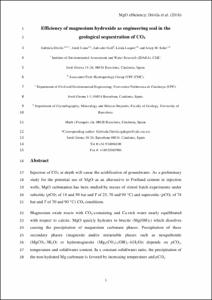Efficiency of magnesium hydroxide as engineering seal in the geological sequestration of CO2

10.1016/j.ijggc.2016.01.031
Inclou dades d'ús des de 2022
Cita com:
hdl:2117/100352
Tipus de documentArticle
Data publicació2016-05
EditorJohn Gale
Condicions d'accésAccés obert
Tots els drets reservats. Aquesta obra està protegida pels drets de propietat intel·lectual i
industrial corresponents. Sense perjudici de les exempcions legals existents, queda prohibida la seva
reproducció, distribució, comunicació pública o transformació sense l'autorització del titular dels drets
Abstract
Injection of CO2 at depth will cause the acidification of groundwater. As a preliminary study for the potential use of MgO as an alternative to Portland cement in injection wells, MgO carbonation has been studied by means of stirred batch experiments under subcritic (pCO(2) of 10 and 50 bar and T of 25, 70 and 90 degrees C) and supercritic (pCO(2) of 74 bar and T of 70 and 90 degrees C) CO2 conditions.; Magnesium oxide reacts with CO2-containing and Ca-rich water nearly equilibrated with respect to calcite. MgO quickly hydrates to brucite (Mg(OH)(2)) which dissolves causing the precipitation of magnesium carbonate phases. Precipitation of these secondary phases (magnesite and/or metastable phases such as nesquehonite (MgCO3 3H(2)O) or hydromagnesite (Mg-5(CO3)(4)(OH)(2) 4(H2O)) depends on pCO(2), temperature and solid/water content. In a constant solid/water ratio, the precipitation of the non-hydrated Mg carbonate is favored by increasing temperature and pCO(2).; The experimental variation of Mg and Ca concentrations and pH over time at the different temperatures and pCO(2) has been simulated using the CrunchFlow reactive transport code. Simulations reproduce the experimental evolution of the aqueous concentrations and indicate a decrease in porosity when increasing temperature and pCO(2). This decrease in porosity would be beneficial for the sealing properties of the cement. These results have been used in the simulation of an application case with a deep borehole surrounded by MgO cement at 90 degrees C.
CitacióDávila, M., Cama, J., Galí, S., Luquot, L., Soler, J. Efficiency of magnesium hydroxide as engineering seal in the geological sequestration of CO2. "International journal of greenhouse gas control", Maig 2016, vol. 48, p. 171-185.
ISSN1750-5836
Versió de l'editorhttp://www.sciencedirect.com/science/article/pii/S1750583616300317
Col·leccions
| Fitxers | Descripció | Mida | Format | Visualitza |
|---|---|---|---|---|
| Dávila et al., ... nesium hydroxide-Proof.pdf | 1,731Mb | Visualitza/Obre |

